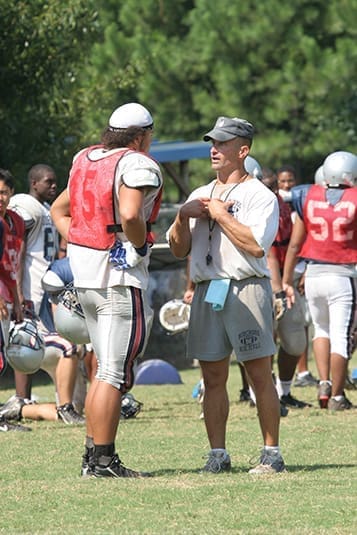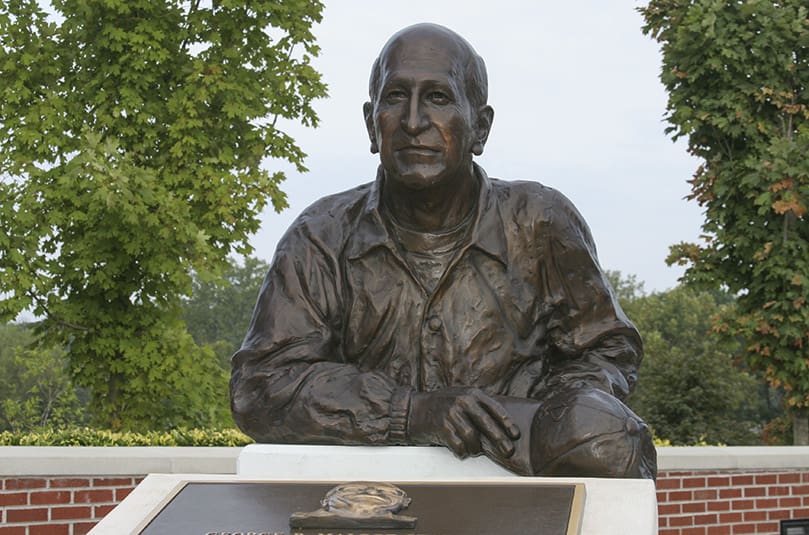A bust of legendary football coach George Maloof is displayed in front of the stadium at St. Pius X High School, Atlanta, that is named after him. George Maloof served as a mentor to many of today's coaches like the ones that go by the name of Azar, Maloof, Standard and Turner. Photo By Michael Alexander
Atlanta
Pius Traditions Connect Coaching Alums
By ANDREW NELSON, Staff Writer | Published September 18, 2008
Coaches schooled in competition as student-athletes a generation ago at St. Pius X High School now cheer, yell and inspire others. Siblings from three families are among a dozen head coaches and athletic leaders around Atlanta formed at the Catholic high school.
Coaches in the Standard, Maloof and Turner families are busy as the football season gets underway.
Teachers and coaches at Pius, the oldest archdiocesan high school, inspired young people on the field and in the classroom. They taught them to compete to the best of their ability. They cared for the young athletes as they taught them life lessons.
George Maloof, Pius’ legendary football coach, gets the credit for being a mentor beyond the gridiron. His sons, Keith and Kevin, lead their own teams as successful coaches.
“He was a great man to play for, but he was very hard,” said Paul Standard, a former player and current head football coach of Pius’ Golden Lions. “Here is the key thing. Coach Maloof had the ability to get across to each of his players that he genuinely cared for each one of them.”
Many remember Maloof’s “hard-nosed attitude” as he earned a record of 168-85-12 during 26 years of coaching at the school. But former players’ strongest memory is his concern for the young men.
“He’d wink at you and give you that great smile he’d give you and say, you’re going to be a winner,” said Pat Standard, a 1986 Pius graduate and a coach at Norcross High School. He is Paul’s younger brother.
The former student-athletes, now approaching middle age, insist that it wasn’t the game tactics of Xs and Os that mattered, but how they felt their coaches cared for them. Win or lose.

Coach Keith Maloof watches the offense scrimmage against the defense during practice. Maloof has been head coach for nine years at Norcross High School. His team won the regional championship in 2006 and 2007. Photo By Michael Alexander
And the affection is returned. George Maloof is still called “coach” more than 20 years after he retired.
“It’s a compliment,” said the senior Maloof, who is 77. He said every student was a champion if they played to the best of their ability, even if the game was lost.
A team was strengthened if everybody played with dedication, he said. “The scoreboard doesn’t always reflect your ability,” he said.
Opened in 1958, Pius today fields 22 varsity teams with 750 athletes. Maloof’s spirit remains at the school, which is attended by more than 1,000 students, even though he retired before the current students were born. A bust of him greets players and fans at the field entrance. The football team plays at the George B. Maloof Stadium.
Paul Standard played on the football team under Maloof and then returned to coach alongside him during breaks from college. He credits the relationship for his career as a teacher and coach.
Maloof encouraged players with a loud bark, but little bite.
“He had this uncanny ability that everything was going to be OK. He believed in you and that was key, really. There was no obstacle, no opponent that was so great we couldn’t be successful,” said the 45-year-old Standard, a member of the class of 1980, who teaches business at the school and is the assistant baseball coach and assistant athletic director.
Today, Standard aims to bring the same feelings to his team. Training is intense. Players know the coaches care about them, he said.
“My coaching style is a lot like George Maloof. I’m not half the coach he is. My style emulates his style and mannerisms and, I think, principles.”
At Norcross High School, Keith Maloof directs the football squad. One of his assistant coaches is Pat Standard. Maloof’s brother, Kevin, coaches at Dacula High School.
Keith Maloof, a 1980 Pius graduate, said as head coach at the public high school for nine years he tries to emulate for his team what he saw at Pius with a “caring and family atmosphere.”
“He would fuss at us, but before you left that field, he’d have his arm around you and pat you on your back,” he said about his dad.
And it wasn’t an easy time. Maloof played as a sophomore and junior on football teams with back-to-back losing seasons.
“In turn, that might have been the best thing for us. In the fact that by the time we were seniors, we saw the groups before us, what they were doing. We were going to be different. We were going to get this thing back on track.”
His senior year, the football team made it to the playoffs.
Keith Maloof, 46, coached his son, Tyler, a University of Georgia freshman, just as his father coached him. His younger son, Tanner, is on the ninth-grade football squad at Norcross.
“I truly enjoy it because every day we could go out and do something together. Those four years I was able to spend with him in high school were very special to me. And as I got older, they were more and more special,” said Maloof, who teaches health/physical education and watches over in-school suspension. His team won the regional championship in 2006 and 2007.
Pat Standard, 41, is a linebacker coach and history teacher at the Gwinnett County school. Coach Maloof left St. Pius in Standard’s senior year, when the team went 1-9. He called it “one of my most painful years.”
But Maloof and other Pius coaches let players know the true measure in sports and in life is dedication. “Everything you do, you do to the best of your ability that God gave you. What God gave you, if you can fulfill that, then really you are a success. Victory is right there in your hands.”

In 1999 Jan Azar became the founding head coach of the girls basketball program at the Wesleyan School, Norcross. Azar coached the team to its first state championship in 2002, and they won again earlier this year. Photo By Michael Alexander
Now, as the coach, Standard said he tries to mirror what he learned.
“You teach the values of life to these young men. You’ve got to get them battle ready. You get them ready for out there,” he said, about life after the crowds have gone home and the lights have dimmed.
Three Turners graduated from Pius—Ricky, Jan and Mike. With coaching in their family tree—an uncle teaches at the college level and an aunt also coaches—it isn’t a shock that all three now lead sports teams at private schools around the region.
Jan Azar teaches and coaches at the Wesleyan School in Norcross, while younger brother Mike is a faculty member and a baseball coach at Mount Vernon Presbyterian School in Sandy Springs.
Ricky Turner played on a Pius football team coached by the senior Maloof just like his father, Ed, did in the late 1950s when Maloof led archrival, Marist School.
“How we treat young people had a big influence because of how they treated me,” said Turner, 41, an acclaimed athletic director at Blessed Trinity High School in Roswell. “They didn’t degrade or tear us apart as human beings; they were always there for us. They were able to coach us, and then on the other hand, correct us in the right way, in a way that was a positive way.”
But beyond the teams and the schoolbooks, Turner said Pius faculty shaped his religious faith. He leaned on it when his young daughter, Jessica, was killed in a car crash several years ago.
“The biggest thing coming out of that was my Catholic education, which later in life paid off more than any athletic thing I ever did,” he said.
He talked about Msgr. Richard Lopez and his counsel getting him through the tragedy.
Turner has been Blessed Trinity’s only athletic director and football coach. In 2007, Turner and the school received the region’s Sportsmanship Award.
“You can have all the talent in the world, but if you aren’t developing these young guys to go out into the real world and how to act and carry themselves. We are trying to win state championships, which we are doing here, but we are trying to do it in the right way,” he said.
Mike Turner said sports at his time at Pius weren’t that successful.
“We struggled when I was there, but (the coaches) still kept it positive,” said Turner, a member of the class of 1989.

Norcross High School defensive coordinator Pat Standard, right, instructs senior linebacker Noland Newton. Standard, the younger brother of St. Pius X football coach Paul Standard, said he tries to teach young people that success is measured by doing everything to the best of their ability on and off the field. Photo By Michael Alexander
“They knew how to keep things fun and that’s the most important thing,” he said.
Turner credited the positive outlook from the coaches in steering him toward coaching.
“If they hadn’t done that, I don’t know where I would have ended up in the coaching world, or if I would have ended up in the coaching world,” he said.
Azar, a member of the Pius class of 1986, knows what it is like to take young people to the big dance. Her girls basketball team has won five state championships since 2002.
Azar said coaches at the Catholic school inspired her to find the balance between playing on the field and academics. She said retired coach and teacher Wright Vermilya showed her how to stand in front of a classroom as a teacher and pace the sidelines. Azar also teaches math.
“He showed me how you could coach and teach at the same time. He taught me it was important to be a teacher first and a coach second because academics are more important than athletics,” she said.
Rivalries are downplayed in the family. But for the record, she does have the most championships.
“Thank goodness we’re in three different sports so we don’t have to go up against each other. It’s great for my parents also because they get a different sport per season to go and support,” said Azar, 39. “But we definitely go and support each other. When we are not in season, we are definitely going to games for each other.”


